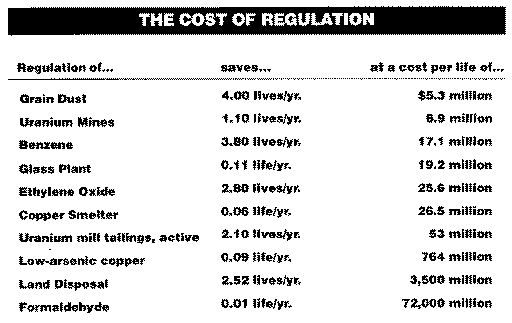
In March '92, regulators at the USA's Office of Management and Budget argued that some regulations intended to save lives may actually put the public in danger. Some regulations are so costly to enforce that they threaten public health indirectly by reducing the public's wealth and income, ultimately killing more people than they would save. There are strong statistical links between long-term income trends and personal health. Using mortality and socio-economic data, Ralph Keeney, a professor of systems science at the University of Southern California, has calculated that every $7.25 million in regulatory costs could plausibly cost one life, by reducing personal wealth and income.
The key question becomes: will a particular regulation improve public health and save more lives than are lost through the costs of that regulation? Federal agencies have in the past proposed regulations which, by their own calculations, would cost as much as $72 billion per life saved (see table).

Proponents of regulation argue that industry often inflates cost estimates of new mandates and underestimates the benefits which can include productivity gains along with health improvements. Nevertheless, these new calculations do help regulatory agencies to appreciate the fact that unnecessary or unnecessarily expensive regulation is not just costly to business, but takes a human toll.
Previous / Next / 1993 Social Inventions Journal Contents